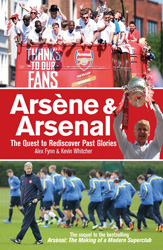Whether we like it or not football today is a business first and foremost, and how well the business is run reflects on the club’s sporting achievements. Few understand the business of football better than Alex Fynn and his latest book: Arsene & Arsenal, the sequel to Arsenal: The Making of a Modern Superclub further examines all aspects of the club offering clear and critical insights as it charts the team’s quest for glory in the 2013/14 season.
The huge volume of information available about Arsenal makes it far easier to be informed about the club, but also more difficult to produce material which stands out amid the 24/7 coverage the club receives. This book stands apart in this regard as it examines the key areas where the club has underperformed: transfer policy, injury record and youth academy. It also offers sensible strategies on how they can be improved. Some of the criticisms echo the voices of many other commentators of the club, but Fynn and co-author Kevin Whitcher quantify and qualify in a way that leaves the reader in no doubt about what can and should be done in the quest for success.
There is praise, and rightly so as the season ended a nine-year trophy drought, for the areas the club have improved – greater value for the brand and use of social media – and a sense of hope that recent changes made in sponsorship deals, youth set up and sports science will push the club further in the right direction.
The book focuses most on Arsene Wenger himself but saves its heaviest criticism for Liam Brady, Arsenal’s former Head of the Youth set up. For a club with a reputation for giving youth a chance, the fact remains that very few of the youthful faces that represent the club actually came through the academy.
The book is rightly respectful of Wenger’s achievements but also questions his ability to adapt as football has changed. The manager’s tactics, substitutions and training methods all come under scrutiny. Fynn and Whitcher repeatedly make the point that Wenger’s greatest successes at Arsenal came when former Vice-Chairman David Dein was at the club, concluding that Dein’s absence has left the club without a figure capable of pushing Wenger ‘when needed’. The book cites the missed opportunity to make signings in the January transfer window, when a genuine chance to win the Premier League beckoned, as an instance when Dein’s influence would have come into play.
The loudest message delivered to the Arsenal board and manager echoes that of the fans who plead for them to ‘spend some f***ing money’ and dismisses the misconception that achieving fourth place in the league replicates winning a trophy. The reality suggests that the board appear more than happy just to be making a profit and will continue to reward the manager handsomely for achieving just that.
The book signs off with a dig at Tottenham and their approach to the transfer market, demonstrating the reality that merely spending money doesn’t guarantee success and neatly encapsulating one of football’s biggest conundrums: which player is really worth the money spent on them?
I suspect that most people’s lists will be very short, and by comparison the few pounds needed to buy this book appear very good value indeed.
Arsène and Arsenal The Quest to Rediscover Past Glories can be bought online direct from the publishers here. Use the promo code ‘Gooner’ to get 10% off the publisher’s price of £8.99. It is also available in bookstores and from other online retailers, such as Amazon. There is a kindle version of the book available too.







